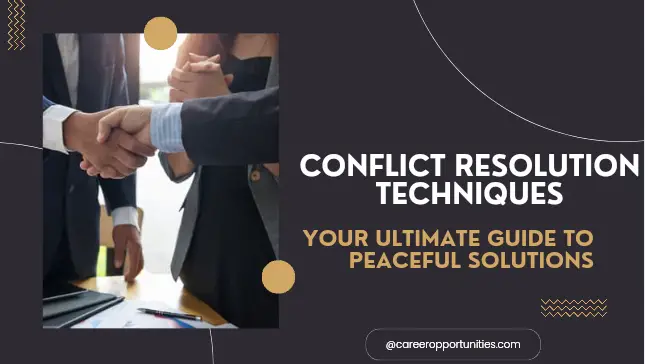
Introduction
In every aspect of life, be it in work, relationships, or even the smallest daily interactions, conflict is almost inevitable.
But just as conflict is a natural part of human interaction, so is the art of resolving it. Mastering effective conflict resolution techniques is essential not only for maintaining peace but also for strengthening the bonds between people.
In this article, we’ll dive into some of the most powerful conflict resolution techniques to help you approach disputes with clarity and confidence.
Top Conflict Resolution Techniques to Embrace
#1. Active Listening: The Key to Understanding
Active listening is one of the most crucial conflict resolution techniques. It’s not enough to simply hear the other person’s words; you need to absorb and process what they’re saying. Active listening involves maintaining eye contact, nodding to show you’re engaged, and asking clarifying questions. When people feel genuinely heard, they’re more likely to calm down and work toward a resolution.
#2. Empathy: Step into Their Shoes
Empathy is a powerful tool in conflict resolution and not just a buzzword. By trying to understand the other person’s perspective, you can respond more compassionately.
💬 Get Paid in Dollars Just by Chatting With Lonely People
Imagine earning daily dollar income from anywhere in the world — no degree, no experience, no interviews — just your phone or laptop.
People are getting paid simply to chat, listen, and keep others company online. This short ebook reveals:
- ✔ Legit platforms that pay in USD
- ✔ How Africans can register & withdraw successfully
- ✔ What to say to keep conversations paid
- ✔ How beginners start with zero experience
Instant download • Works worldwide • Beginner-friendly
This is one of those conflict resolution techniques that requires patience and a willingness to set aside your own viewpoint temporarily.
When both parties in a conflict make an effort to understand each other’s feelings and perspectives, it often results in a faster and more satisfying resolution.
#3. Finding Common Ground: Build on Agreements
Another core conflict resolution technique is identifying common ground. Rather than focusing on what divides you, look for areas where you both agree.
This helps shift the conversation from a “me versus you” mindset to a “we” perspective. Finding common ground can be as simple as acknowledging shared values, goals, or concerns.
In order to build on common ground, begin by stating areas where you both agree, even if they’re small. Use phrases like, “We both want to find a solution that works for everyone.”
#4. Problem-Solving Together: Brainstorm Solutions
One of the most effective conflict resolution techniques is to collaborate on finding solutions. Instead of approaching a conflict with a “winner-takes-all” attitude, invite the other person to brainstorm solutions together. This can lead to creative problem-solving and a deeper sense of teamwork.
To approach problem-solving, frame the situation as an opportunity to work together. Try saying, “Let’s see if we can find a solution that addresses both our needs.”
#5. Using “I” Statements: Keep the Focus on You
During conflict, it’s easy to point fingers and assign blame. However, one of the most constructive conflict resolution techniques is to use “I” statements.
This shifts the focus to how the conflict affects you personally, without sounding accusatory. For example, instead of saying, “You never listen to me,” say, “I feel unheard when my ideas aren’t acknowledged.”
#6. Mediation: Bring in a Neutral Party
Sometimes, a third-party mediator can help when other conflict resolution techniques have failed. A mediator can offer an objective perspective, facilitate dialogue, and suggest solutions both parties may not have considered.
Mediation is especially helpful in complex or high-stakes conflicts.
To approach mediation when the conflict is particularly heated, suggest bringing in a mediator by saying something like, “I think it might be helpful to have someone neutral help us work through this.”
When to Apply Conflict Resolution Techniques
Knowing which conflict resolution technique to use, and when to use it, takes practice. Not every conflict requires mediation, nor does every disagreement need a lengthy discussion.
The key is to assess the situation, consider your goals, and choose the most appropriate approach. Whether you’re facing a minor miscommunication or a deeply-rooted disagreement, having these conflict resolution techniques at your fingertips will empower you to respond effectively.
Conclusion
Mastering conflict resolution techniques is an invaluable skill for anyone who values healthy relationships and productive interactions. While conflicts are natural, letting them spiral out of control is not.
With active listening, empathy, common ground, and a collaborative spirit, you can turn disagreements into opportunities for growth and understanding.
Conflict doesn’t have to be destructive; with the right conflict resolution techniques, it can become a stepping stone to stronger, healthier connections.
Also Read;
Top 8 Most Common Interview Questions and Tips on How to Answer Them
Body Language in interviews | how to make a great impression
10 Interview Preparation Strategies to Help you Ace Your Next Job
Salary Negotiation Tactics |How to Get paidWhat You Deserve
🔥 Want to Make Money Online the Right Way?
Discover how smart people are quietly earning with AI, Email Marketing, CPA, LinkedIn, Online Teaching & Content Creation.
This is not theory — it’s a step-by-step system.
👉 Get the Ebook Now











